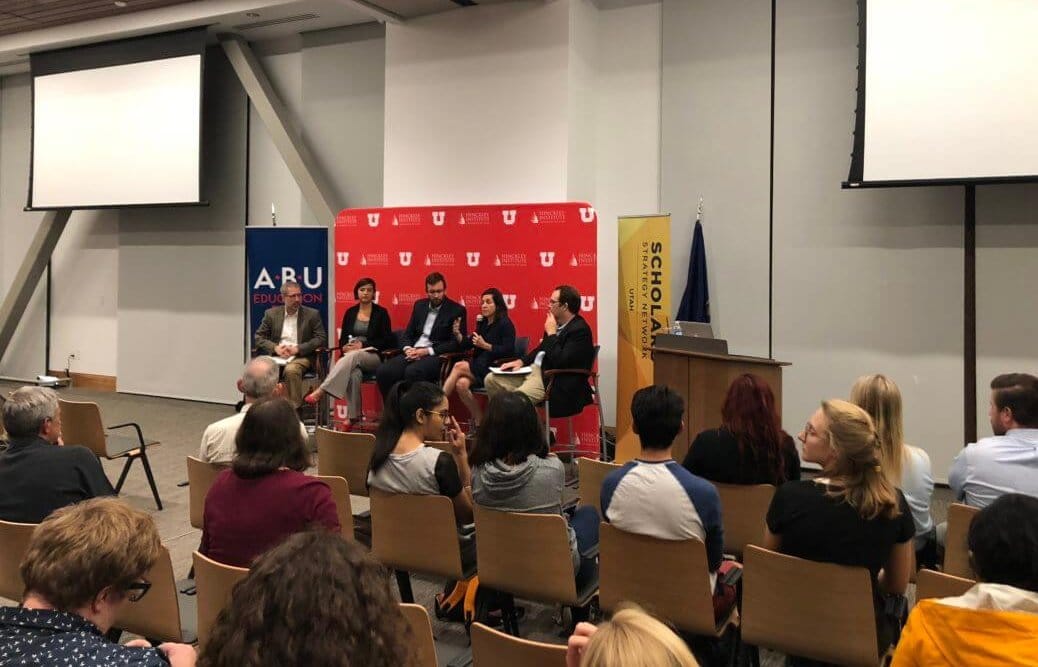This article originally appeared in the Utah Chronicle. Read it in its entirety here.
Proposition 3 is meant to expand Utahn access to Medicaid under the Affordable Care Act (also known as the ACA or Obamacare) by allowing people who make up to 138 percent of the federal poverty line to qualify. Currently, the State legislature is seeking a waiver to allow for only a partial expansion which includes only up to 100 percent of the poverty line as well as additional work requirements.
The Hinckley Institute of Politics hosted a panel discussion about the ballot initiative organized by the Alliance for a Better Utah (ABU) Education Fund, The John R. Park Debate Society, and the Scholars Strategy Network as part of a series titled “Unpacking the Initiatives.” Comprising the panel were Dr. Colleen Grogan, professor of social service administration at the University of Chicago; Dr. Phillip Singer, professor of political science at the University of Utah; RyLee Curtis, campaign manager for Utah Decides Healthcare; Dr. Norman Waitzman, professor of economics also at the U; and also Dr. Michael Middleton, director of the John R. Park Debate Society.
There was little debate between the panelists. All of them agree Utahns should vote for Prop 3. Dr. Grogan encourages voters to think of the people that they know who are on Medicaid, saying that 70% of people have a close friend or family member use the program. Dr. Waitzman said, “Every argument, every economic argument against expanding Medicaid is debunked.” Any Medicaid expansion would receive 90 percent of its funding from the federal government and 10 percent from the state. However, Dr. Waitzman repeatedly emphasized that the influx of federal dollars in the state would be a net economic benefit for the state. Utah already pays for the funds of other states who have chosen to expand Medicaid. As Curtis said, “We have been sending all this money to Washington D.C. … and we haven’t been getting our share back.” Curtis also mentioned that the costs of those who are not insured on Medicaid but would be by Prop 3 are currently born by taxpayers. Many people seek emergency health treatment in prisons, psychiatric institutes and emergency rooms.
Even though the panel lacked opponents of the proposition, it’s noteworthy that each panelist defended the full expansion of the proposition over the legislature’s partial expansion. Dr. Singer noted that work requirements implemented in Arkansas resulted in thousands being left off of Medicaid roles. Similar requirements are in the legislature’s proposed plan. Additionally, Dr. Grogan mentioned that the difference between 100 percent and 138 percent of the federal poverty line is a difference of thousands of people. Dr. Grogan asked, “Why wouldn’t you want to ensure more people, not less?” Curtis also said that “We don’t know if they [Centers for Medicare and Medicaid Services] are going to approve the waiver.”
Dr. Middleton asked the panelists to respond to some criticisms of the proposition raised by opponents. When responding to the criticism that the Medicaid system is a broken and therefore inefficient means of extending health care to more people, Dr. Waitzman said the “Medicaid program is very efficient in terms of cost per person.” Dr. Grogon also stated that optimizing reforms have often been made to Medicaid in states which have passed Medicaid expansion. Grogan also said that we should “fix the system” of Medicaid.
All panelists encouraged voters to find out more information about Medicaid expansion and to vote. Katie Matheson, communications director of Alliance for a Better Utah said: “There is a lot for Utahns to consider as they get closer to election day and we hope that Utahns will choose and vote for full Medicaid expansion through Proposition 3.”
The event focused heavily on the panelist’s support for the proposition. Christian Mickelsen, a Senior at the U majoring in Political Science and Economics, attended the event. He said “It [the event] was fairly informative,” but that “it was more towards the advocacy of Prop 3 rather than the discussion around it.” Although the entirety of the panel’s discussion did advocate for the ballot initiative, moderator Dr. Middleton did often ask the panelists to address why the legislature’s proposed limited expansion is not better suited for Utah than a full expansion under Prop 3. Dr. Middleton again challenged the panelists by asking them to respond to recently aired criticisms of the proposition. Nevertheless, the panel was significantly in favor of Proposition 3.
Proposition 3 is one of 4 ballot questions appearing on this year’s midterm ballots. Salt Lake County has already mailed out ballots. Election day is Tuesday, November 6th.
This article originally appeared in the Utah Chronicle. Read it in its entirety here.

